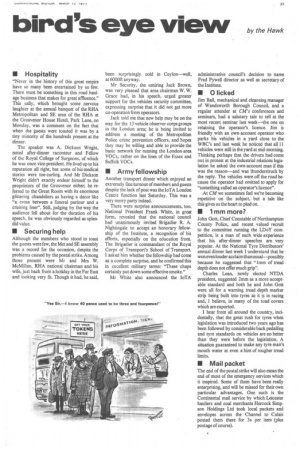bird's eye view by the Hawk
Page 33

If you've noticed an error in this article please click here to report it so we can fix it.
• Hospitality
"Never in the history of this great empire have so many been entertained by so few. There must be something in this road haulage business that makes for great affluence." This sally, which brought some nervous laughter at the annual banquet of the RHA Metropolitan and SE area of the RHA at the Grosvenor House Hotel, Park Lane, on Monday, was a comment on the fact that when the guests were toasted it was by a tiny minority of the hundreds present at the dinner.
The speaker was A. Dickson Wright, noted after-dinner raconteur and Fellow of the Royal College of Surgeons, of which he was once vice-president. He lived up to his reputation all right, but some of his medical stories were toe-curling. And Mr Dickson Wright didn't exactly endear himself to the proprietors of the Grosvenor either; he referred to the Great Room with its enormous glittering chandeliers as having a decor like "a cross between a funeral parlour and a cruising liner". Still, judging by the way the audience fell about for the duration of his speech, he was obviously regarded as splendid value.
• Securing help
Although the members who stood to toast the guests were few, the Met and SE assembly was a record for the occasion, despite the problems caused by the postal strike. Among those present were Mr and Mrs W. McMillan, RHA national chairman and his wife, just back from a holiday in the Far East and looking very fit. Though it had, he said, been surprisingly cold in Ceylon—well, at 6000ft anyway.
Mr Security, the untiring Jack Brown, was very pleased that area chairman W. W. Grace had, in his speech, urged greater support for the vehicles security committee, expressing surprise that it did not get more co-operation from operators.
Jack told me that new help may be on the way for the 13 vehicle observer corps groups in the London area; he is being invited to address a meeting of the Metropolitan Police crime prevention officers, and hopes they may be willing and able to provide the basic network for running the London-area VOCs, rather on the lines of the Essex and Suffolk VOC s.
• Army fellowship
Another transport dinner which enjoyed an extremely fine turnout of members and guests despite the lack of post was the IoTA London Centre function last Saturday. This was a very merry party indeed.
There were surprise announcements, too. National President Frank White, in great form, revealed that the national council had unanimously invited Brigadier R. A. Nightingale to accept an honorary fellowship of the Institute, a recognition of his efforts, especially on the education front. The Brigadier is commandant of the Royal Corps of Transport's School of Transport. I asked him whether the fellowship had come as a complete surprise, and he confirmed this in excellent military terms: "These chaps certainly put down some effective smoke."
Mr White also announced the IoTA administrative council's decision to name Fred Pywell director as well as secretary of the Institute.
• 0 licked
Jim Ball, mechanical and cleansing manager of Wandsworth Borough Council, and a regular attender at CM's conferences and seminars, had a salutary tale to tell at the most recent seminar last week—the one on retaining the operator's licence. Jim is friendly with an own account operator who parks his vehicles in a yard close to the WBC's and last week he noticed that all 11 vehicles were still in the yard at mid-morning. Thinking perhaps that the drivers had come out in protest at the industrial relations legislation he asked the own-account man if this was the reason—and was thunderstruck by the reply. The vehicles were off the road because the operator had omitted to apply for "something called an operator's licence".
At CM we sometimes feel we're becoming repetitive on the subject, but a tale like this gives us the heart to plod on.
• mm more?
John Gott, Chief Constable of Northampton County Police, and recent valued recruit to the committee running the LDoY competition, is a man of such wide experience that his after-dinner speeches are very popular. At the National Tyre Distributors' annual dinner last week I understand that he won even louder acclaim th an usu al—pos sibly because he suggested that " 1 mm of tread depth does not offer much grip".
Charles Lean, newly elected NTDA president, suggested 2mm as a more acceptable standard and both he and John Gott were all for a warning tread depth marker strip being built into tyres as it is in racing and, I believe, in many of the road covers which are exported.
I hear from all around the country, incidentally, that the great rush for tyres when legislation was introduced two years ago has been followed by considerable back pedalling and tyre standards on vehicles are no better than they were before the legislation. A situation guaranteed to make any tyre man's mouth water at even a hint of tougher tread limits.
• Mail packet
The end of the postal strike will also mean the end of most of the emergency services which it inspired. Some of them have been really enterprising, and will be missed for their own particular advantages. One such is the Continental mail service by which Leicester hauliers and coal merchants Hercock Simpson Holdings Ltd took local packets and envelopes across the Channel to Calais posted them there for 3s per item (plus postage of course).






















































































